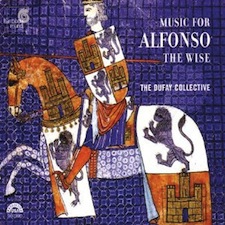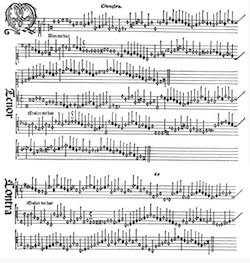The past couple of weeks have been very busy. I’ve been working with Richard Karpen on a couple of projects that involve a different approach to composing that involves a much more oral transmission of musical ideas to performers rather then a written medium. The results become pieces in much the same way that written scores do. For instance, we have started to notice with his guitar and electronics piece ‘Strand Lines’ written for Stefan Östersjö that there is a correct way to play the work as well as the danger of making mistakes. One of the conclusions Richard has come to as a result of this process is, if there can be mistakes and if there IS a right way to play the piece, then there must be a piece (even without it being written down).
The ephemeral quality of music in general (even when it has been written down, it is over once the air ceases to vibrate) is one of the most magical aspects of the medium. And tonight’s rips (recordings of music that is hundreds of year’s old) made me connect Richard’s music to how we choose to perform ‘ancient’ music. And in many ways, any music at all. The first disc was a collection by the Dufay Collective called ‘Music for Alfonso the Wise’. Alfonso being an Iberian king from the 13th century, and this collection is a reflection of of the music that was performed in his court. Sometimes the composer isn’t known, and I imagine all the instruments used for the performances are recreations of original instruments. When I was playing it in the background the other night, Tamiko asked if it was music from India, and sure enough once she said that I could hear the influences very clearly (not that this was music that was influence by the subcontinent in the 1200s, but that they must have some common ancestor, probably from the Middle East??? I really don’t know but am guessing). I also thought the Portland group ‘3 Leg Torso’ must get quite a bit from this kind of music. The instruments are more nasal string instruments and buzzy winds, and often have some thumpy drums as accompaniment.
Obviously, we have absolutely NO way to know exactly what this music sounded like, and I imagine there are a number of levels of translation between the written notation that does exist and what the performers on the disc are used to perform from. But I also imagine that with some practice and informed knowledge, these players are presenting (with modern fingers for modern ears) what we probably think the music may have sounded like. But I don’t think there is a belief on anyone’s part that what we are hearing is exactly what Alfonso the Wise would have been hearing. The musicians are creating now from a set of instructions what they can produce. They have direction, and need to shape what they can from the materials that they have. And once I find that I can accept what these ideas, I of course see that, really, this is what all music is. Richard’s work from the past couple weeks, when someone plays Beethoven, when someone uses a recording of a Stockhausen piece as part of their research into how to perform something or when a garage band gets together and starts off playing ‘Louie Louie’. What a great tradition to be part of… no?
So the rest of tonight’s rips are in this mode… music so old that we can’t even ask someone with connections of a couple generations back to its performance what they heard. Not that it would really matter… ask me what a concert a week ago sounded like, then ask someone else at the same concert and I think you would get two different takes on the performance, but when we are dealing with music that is 500 years old, I doubt we can find anyone around who can say ‘ah, yes, my grandfather heard that performed at the premiere and this is what he said it sounded like’ (this being a phrase that is not out of the question for Stravinsky or Debussy). The other discs are Anonymous 4’s ‘1000: A Mass for the End of Time’ (or the music that would have been around when people were worrying about the y1k bug, ‘La Bele Marie: Songs to the Virgin from 13th-century France’. Fretwork’s disc of Ottaviano dei Petrucci’s “Harmonice Musices Odhecaton” and Ensemble Organum’s ‘Le Chant des Templiers XIIè siècle : Manuscrit du Saint-Sépu’.
Pretty amazing that I can simply grab a disc with 0s and 1s on it and hear music performed that has over a 1000 years of history. I can only imagine what will happen by the year 3000.



